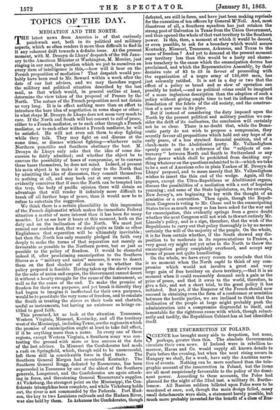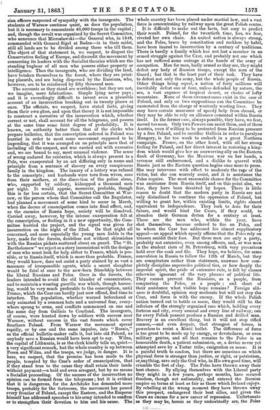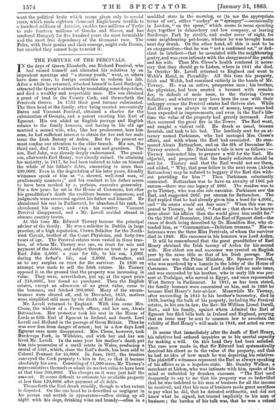sian officers suspected of sympathy with the insurgents. The students
of Warsaw continue quiet, as does the population, but it is necessary to concentrate 40,000 troops in the capital ; and, though the revolt was organized by the Secret Committee, who announce that Mieroslawski—the General who, in 1848, commanded with General Sigel at Baden—is in their midst, still all lands are to be divided among those who till them. The object of that statement is, we suspect, to disgust the Conservative feeling of Europe, and discredit the movement by connecting its leaders with the Socialist theories which are the standing bugbear of all men who possess either property or intelligence. Then the insurgents, who are dividing the land, have betaken themselves to the forest, where they are print- ing placards, and are being dispersed by the Russians, who, however, are to be reinforced by fifty thousand men. The accounts as they stand are worthless ; but they are not, we imagine, mere fabrications. Simple lying never pays ; and it is exceedingly difficult to invent even a plausible account of an insurrection breaking out in twenty places at once. The officials, we suspect, have stated facts, giving them their own gloss, and upon that theory it is not impossible to construct a narrative of the insurrection which, whether correct or not, shall account for all the telegrams, and possess at the same time some faint degree of probability. It is known, on authority better than that of the clerks who prepare bulletins, that the conscription ordered in Poland was hurried in order to meet some movement supposed to be impending, that it was arranged on no principle save that of including all the suspect, and was carried out with excessive and, we are bound to say, most unusual violence. The sense of wrong endured for centuries, which is always present to a Pole, was exasperated by an act differing only in name and principle from a sentence of slavery on every conspicuous family in the kingdom. The luxury of a lottery was refused to the conscripts ; and husbands were torn from wives, sons from their mothers, at the discretion of the police alone, who, supported by soldiery, kidnapped a thousand men per night. It would appear, moreover, probable, though this is far less certain, that the Secret Committee at War- saw, or the person whom that Committee call the Regulator, had planned a movement of some kind to occur in March, when the decree of emancipation comes into final effect, and, as the enemies of Russia hope, society will be dissolved. Carried away, however, by the intense exasperation felt at the conscription, or finding in it a new opportunity, the Com- mittee hurried the project, and the signal was given for insurrection on the night of the 22nd. On that night all concerned, and more especially the young men liable to the levy, made for the forests, doubtless not without skirmishes with the Russian pickets scattered about on guard. The " St. Bartholomew" we reject as a story inconsistent with the designs of men who must look for help either to France, which is pos- sible, or to Russia itself, which is more than probable. France, they would know, dare not assist a party stained by so vast a massacre of irresponsible agents, while a secret slaughter would be fatal at once to the new-born friendship between the liberal Russians and Poles. Once in the forests, the leaders intended to avoid the old blunder of concentration, and to maintain a wearing guerilla war which, though harass- ing, would be very much preferable to the conscription, until France, which the Czar can hardly just now offend, find time to interfere. The population, whether warned beforehand or only animated by a common hate and a universal fear, every- where sprang to arms, and conflicts commenced on one and the same day from Clallicia to Courland. The insurgents, of course, were hunted down by soldiers with success near Warsaw, without success in the vast forests which cover Southern Poland. From Warsaw the movement spread rapidly, or by one and the same impulse, into " Russia," as the official bulletin-maker calls it, but into old Poland, as anybody save a Russian would have been apt to say. Wilna, the capital of Lithuania, is as the clerk kindly tells us, quiet— a very significant remark, but the whole country is up between Posen and Wilna, and the troops, we judge, in danger. It is here, we suspect, that the promise has been made to the people, tempted by the Czar's order of emancipation, that if they stand true to the cause they shall retain their lands without payment—a bold and even arrogant, but by no means a Socialist proceeding. Of the success of the insurrection no opinion can be formed from the telegrams ; but it is evident that it is dangerous, for the Archduke has demanded more troops, probably for the fortresses, the movement has passed every frontier of Poland, except the Eastern, and the Emperor himself has addressed speeches to his army intended to confirm or to strengthen their devotion to hiin and his cause. The whole country has been placed under martial law, and a vast force is concentrating by railway upon the great Polish centre.
It is difficult to make out the facts, but easy to predict their result. Poland, for the twentieth time, has, we fear, riveted her own chain. An united nation is always strong, and the Poles, brave by constitution and reckless by habit, have been inured to insurrection by a century of traditions. There is hardly a family which has not lost a member in an armed struggle against the Czar, and probably not one which has not suffered some outrage at the hands of the army of occupation. Man for man, badly armed as they are, they might defeat any body of Russian troops, except the men of the Guard ; but that is the least part of their task. They have to defeat not only the army, but the whole people of Russia. Other things being equal, a nation of forty millions will inevitably defeat one of four, unless defended by nature, the sea, a vast expanse of tropical desert, or chains of lofty mountains. None of these circumstances exist in the case of Poland, and only on two suppositions can the Committee be exonerated from the charge of wantonly wasting lives. They may have certain assurance of speedy help from abroad, or they may be able to rely on alliances cemented within Russia itself. In the former case, always possible, they have, we fear, moved too soon. Only two Powers can assist them, and of these Austria, even if willing to be protected from Russian pressure by a free Poland, and to sacrifice Gallicia in order to paralyze Hungary, is far too weak to embark in a great Northern campaign. France, on the other hand, with all her strong feeling for Poland, and her direct interest in restoring a king- dom which would give her an unswerving ally on the Eastern flank of Germany, has the Mexican war on her hands, a revenue still embarrassed, and a dislike to quarrel with Russia just as the Eastern question begins once more to press. She may intervene with effect to moderate the rage of the victor, but she can scarcely assist, and it is assistance the Poles require. The most reasonable chance for the Committee was assistance from Russia itself, and on this point also, we fear, they have been deceived by hopes. There is little reason to doubt that the modern party in Russia are not only disinclined to continue the oppression of Poland, but willing to grant her, within existing limits, rights almost equivalent to independence. They look to Asia for their future, and would bind the Czars, if they could, to abandon their German drehm for a century at least. These are the men who, within the year, have shot themselves, because ordered to fire on Poles, and to whom the Czar has addressed his almost supplicatory appeal—an appeal which openly affirms that the Poles rely on treason amidst their foes. But these men are only a party, probably not extensive, even among officers, and, as was seen in the student riots of St. Petersburg, with very precarious hold over the rank and file. They hope, we believe, for some convulsion in Russia to follow the 12th of March, but they are conspirators rather than statesmen, unaware how com- pletely discipline supersedes political ties, or how deeply the imperial spirit, the pride of extensive rule, is felt by classes otherwise ignorant of the very phrases of political life. They cannot prevent the Russians, as a people, from conquering the Poles, as a people ; and short of their assistance what visible hope remains ? Foreign alli- ance is doubtful, opinion may moderate but will not stop the Czar, and force is with the enemy. if the whole Polish nation turned out to battle en masse, they would still be the inferiors of the strongly organized race which, holding every fortress and city, every arsenal and every line of railway, can for every Polish peasant produce a Russian and drilled man. Bravery is an excellent thing, but it will not stop rifled cannon,—and even despair, that strongest of forces, is powerless to resist a Annie' bullet. The difference of force is too great to be made up by energy, or devotedness, or even military genius, and all that remains to the Poles is an honourable death, a patient submission, or, a device never yet attempted save by a Tartar tribe, emigration en mane. It is a painful truth to confess, but there are occasions on which physical force is stronger than justice, or right, or patriotism, or anything, save only the God who, in His own good time, will crumble the feet of clay. The Poles have thrown away their best chance. By allying themselves with the Liberal party they might in a few years, perhaps months, have secured freedom, though not nationality, and entered the Russian empire on terms at least as fair as those which Ireland enjoys. By rebelling at the wrong moment they have thrown away this prospect, endangered their best allies, and given the Czars an excuse for a new career of repression. Unfortunate as they may be, heroic as they undoubtedly are, the Poles want the political brain which seems given only to special races, which made eighteen thousand Englishmen terrible to a hundred millions of Asiatics, enables two millions of Turks to rule fourteen millions of Greeks and Slaves, and has rendered Hungary for five hundred years the most formidable and the most free dependency of the Germanic race. The Poles, with their genius and their courage, might rule Russia, but unaided they cannot hope to resist it.
































 Previous page
Previous page